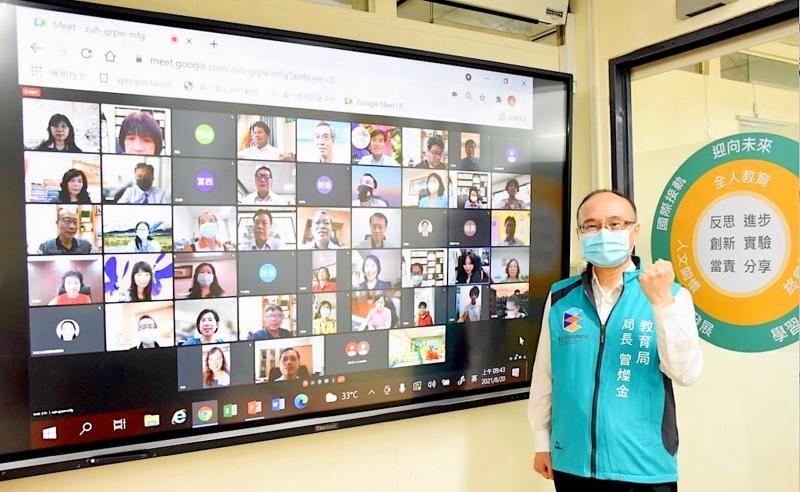The Taipei City Government’s first digital experimental high school would soon begin taking applications for the 2022-2023 academic year, the Taipei Department of Education said on Saturday.
An online session would be held tomorrow to explain to parents and prospective students the concept behind Taipei Digital Experimental High School (T-school) and provide other information, the department said in a statement.
The school would announce the admission requirements in the first half of next month, ahead of the new academic year that starts in August, and would admit only 48 students, the department said.

Photo courtesy of the Taipei Department of Education
Applications would be open to individual students at the junior-high school level, and those who are accepted for the 2022-2023 school year would have the opportunity to learn any time and anywhere, it said.
The curriculum incorporates technology to create a new learning experience, the department said.
It said the “T” in T-school stands for Taipei, technology and talent, as well as the recruitment and cultivation of people with so-called “T-shaped skills,” which in job recruitment refers to expertise in a single field and the ability to collaborate across different disciplines.
The establishment of T-school, the first of its kind to be run by the city government, was approved last year by the Ministry of Education, allowing the use of physical and digital resources for teaching.
By approving the establishment of the school, the ministry has acknowledged Taipei’s achievements over the past few years to create smart technology campuses that incorporate digital education, the department said.
Department Commissioner Tseng Tsan-chin (曾燦金) said Taipei has achieved impressive results in its efforts to incorporate hybrid learning, which uses virtual resources and smart technology in its experimental schools.
Taipei has 10 such experimental schools at different levels, with well-rounded online-learning platforms, resources and faculties, Tseng said.

Taiwan has received more than US$70 million in royalties as of the end of last year from developing the F-16V jet as countries worldwide purchase or upgrade to this popular model, government and military officials said on Saturday. Taiwan funded the development of the F-16V jet and ended up the sole investor as other countries withdrew from the program. Now the F-16V is increasingly popular and countries must pay Taiwan a percentage in royalties when they purchase new F-16V aircraft or upgrade older F-16 models. The next five years are expected to be the peak for these royalties, with Taiwan potentially earning

STAY IN YOUR LANE: As the US and Israel attack Iran, the ministry has warned China not to overstep by including Taiwanese citizens in its evacuation orders The Ministry of Foreign Affairs (MOFA) yesterday rebuked a statement by China’s embassy in Israel that it would evacuate Taiwanese holders of Chinese travel documents from Israel amid the latter’s escalating conflict with Iran. Tensions have risen across the Middle East in the wake of US and Israeli airstrikes on Iran beginning Saturday. China subsequently issued an evacuation notice for its citizens. In a news release, the Chinese embassy in Israel said holders of “Taiwan compatriot permits (台胞證)” issued to Taiwanese nationals by Chinese authorities for travel to China — could register for evacuation to Egypt. In Taipei, the ministry yesterday said Taiwan

Taiwan is awaiting official notification from the US regarding the status of the Agreement on Reciprocal Trade (ART) after the US Supreme Court ruled US President Donald Trump's global tariffs unconstitutional. Speaking to reporters before a legislative hearing today, Premier Cho Jung-tai (卓榮泰) said that Taiwan's negotiation team remains focused on ensuring that the bilateral trade deal remains intact despite the legal challenge to Trump's tariff policy. "The US has pledged to notify its trade partners once the subsequent administrative and legal processes are finalized, and that certainly includes Taiwan," Cho said when asked about opposition parties’ doubts that the ART was

If China chose to invade Taiwan tomorrow, it would only have to sever three undersea fiber-optic cable clusters to cause a data blackout, Jason Hsu (許毓仁), a senior fellow at the Hudson Institute and former Chinese Nationalist Party (KMT) legislator, told a US security panel yesterday. In a Taiwan contingency, cable disruption would be one of the earliest preinvasion actions and the signal that escalation had begun, he said, adding that Taiwan’s current cable repair capabilities are insufficient. The US-China Economic and Security Review Commission (USCC) yesterday held a hearing on US-China Competition Under the Sea, with Hsu speaking on